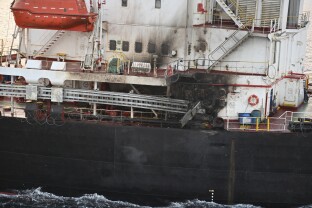As the White House commits to more airstrikes in Yemen and deals with two missing Navy SEALs in the Red Sea, members of Congress are saying President Joe Biden is long overdue for oversight of the United States’ escalating involvement in the Middle East.
“I think we’re being drawn into a regional conflict and the Congress needs to have a say on it,” Rep. Ro Khanna (D-Calif.) told NOTUS.
It’s a rare moment when the White House motivates both progressive and conservative lawmakers to agree, and this one comes as a multinational military force becomes more directly engaged with Yemen’s Houthi rebels.
“I worry we could be setting ourselves up for some sort of Gulf of Tonkin situation,” Rep. Matt Gaetz (R-Fla.) said. “I think the interdiction stuff that we’re doing, that these SEALs are involved in, combined with the growing hostilities and the airstrikes would prompt a debate in the Congress and a War Powers vote.”
Biden admitted Thursday that the airstrikes, which the White House — alongside the United Kingdom — announced late last week as a “defensive” measure were not working, but would continue. “When you say working, ‘Are they stopping the Houthis?’ No,” Biden told reporters Thursday. “Are they going to continue? Yes.”
The White House informed Congress of the strikes 48 hours before it started to carry them out. Biden’s administration described the airstrikes as “defending international shipping” and a “direct response” to Houthi attacks on ships — including American ones — in the region.
“They had the time to go to Britain and Australia, Canada, the U.N. I mean, we’ve known about this situation since December,” Khanna said. “They should have been coming to the Congress for a limited authorization, to say if there are disruptions in trips we want to be taking this action for future deterrence.”
Khanna added that commercial shipping in the Red Sea is “disrupted as ever.”
The U.S.’s initial strikes were met with criticism from both the left and right flanks of Congress. Arizona Rep. Andy Biggs, former chair of the conservative House Freedom Caucus, posted on X that Biden “can’t unilaterally pull us into another war.”
Similarly, fellow Freedom Caucus member, Rep. Eli Crane of Arizona, told The American Conservative that “Biden needs to make the case to this body so we’re not haphazardly drawn into another forever war.”
Progressive Caucus Chair Rep. Pramila Jayapal called the strikes an “unacceptable violation of the Constitution.” Likewise, New York Democratic Rep. Jamaal Bowman told NOTUS this week, “unilateral presidential military action is dangerous no matter who is president.”
The U.S., along with its international allies like the U.K., Australia and Canada, have for years been concerned about maritime security in the region and organized a task force “committed to defending international shipping and deterring Houthi attacks” in mid-December. The recent airstrikes, however, the Pentagon maintains were part of a separate military operation.
Biden also has bipartisan support in Congress for his actions in Yemen — including from House Speaker Mike Johnson, who said the strikes were “long overdue.”
But even those who support Biden’s actions, are wary of the White House escalating action without congressional oversight.
“I wouldn’t say they’re overstepping their bounds, given everything that’s been developing over the past couple of weeks, with the Houthis and how they’re aggressively moving on the space,” Republican Rep. Morgan Luttrell said. “Worst thing that we could ever do is go back to war. After fighting two wars myself, the worst thing we could do is put us in a position to have my sons have to go back.”
—
John T. Seward is a NOTUS reporter and an Allbritton Journalism Institute fellow.
Sign in
Log into your free account with your email. Don’t have one?
Check your email for a one-time code.
We sent a 4-digit code to . Enter the pin to confirm your account.
New code will be available in 1:00
Let’s try this again.
We encountered an error with the passcode sent to . Please reenter your email.


